TV Sci-Fi Monthly
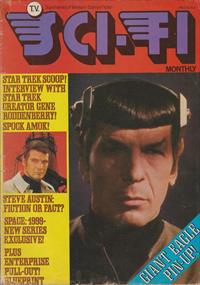
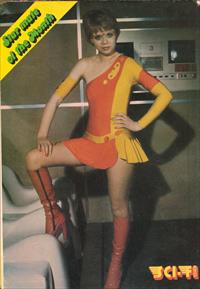
This issue has a short news piece about Barry Morse leaving the series, separate from the main article about the new series 2 (which mentions pilot "Nick" Carter). The centre-page poster is an Eagle struck by lightning (a rather blurry photo), and Zova is "star-mate of the month" on the back page.
Although the new series of Space: 1999 has brought to the screen a crop of fresh faces - notably the female alien Maya - it has also caused at least on casualty. It appears that Professor Bergman the amiable father figure of Moonbase Alpha, has been lost in space.
Professor Bergman - played by veteran London actor Barry Morse (The Fugitive, The Adventurer, The Zoo Gang ) - was an English professor who was plucked from the security of an Earthbound posting to lecture on Moonbase Alpha. When the Moon went out of orbit, his cool resourcefulness greatly assisted Koenig in making decisions affecting the Base
Apart from his logical, academic brain, Bergman's coolness stemmed largely from his unique medical history. An early illness led to his having a mechanical heart-replacement. This, because it responded more slowly to nervous stimuli than a normal heart, reduced his reactions to emotional stress.
Now, although the Space: 1999 production team is being rather tight lipped about his future, it appears Bergman has disappeared in Deep Space. Apparently the space craft he was piloting simply vanished.
Bergman's mysterious fate will undoubtedly prove a great loss to Koenig and the rest of the Moonbase Alpha crew. But perhaps, one day, the rogue moon and the Professor will once again cross paths. In space, anything is possible!
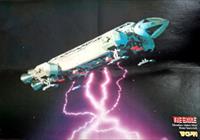
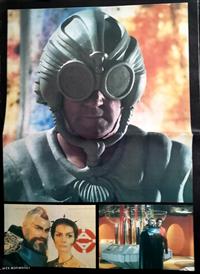
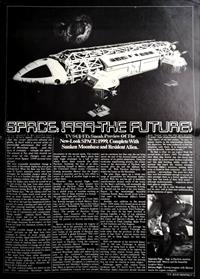
TV SCI-FI's Sneak Preview of the New-Look Space: 1999, Complete With Sunken Moonbase and Resident Alien
As we reported in last month's issue of TV SCI-FI, Space: 1999, the show that has swept networks around the globe, is back with a second series of interstellar adventures. But will the face of Moonbase Alpha - and the face it contains - remain the same? The answer is No, and this month we list some of the changes you can expect from Space: 1999 second time around.
The most noticeable immediate change is that much of Moonbase Alpha has now gone underground. When the Base was first built, none of Earth's scientists could ever have envisaged the incredible dangers which lay ahead of it as it hurtled through space. The series' designers believe that one of the first things the Alpha crew would do would be to try and protect the base from alien attack.
"Winston Churchill had his control centre underground during World War II," designer Keith Wilson says. "We are taking a leaf out of his book. It makes much more sense and gives us more freedom of action in the stories because of the safety from radiation."
Not all of the base has disappeared below ground, of course. Landing and take-off pads and other external essentials remain on the Moon's surface. However, the whole visual feel is one of contraction and compactness. "Being smaller," explains Keith Wilson, "gives a closer feel to the action and heightens the atmosphere of excitement when danger threatens. In retrospect, we feel it was too large for television screens in the first series."
Another notable change is that the old 'unisex' uniforms on the Base have been scrapped in favour of more casual and individual clothes. Again the show's designers feel that by now the Alphans would have devised means of making their own outfits, thereby enabling them to change out of there rather austere uniforms more often. It seems as if the female crew have all opted for skirts rather than their original trousersuits.
But apart from these rather incidental changes, the big change in the second series is the permanent addition to the crew of Moonbase Alpha of an alien. However, Mr. Spock she is definitely not!
The new additions makes her debut in the very first adventure Moonbase Alpha encounters in the second series. The trouble begins when two of the Base's pilots find their Eagle enveloped by a ball of light which draws them towards the planet Psychon. Suddenly the face of an alien, introducing himself as Mentor, appears on the Command Center screen. Commander Koenig persuades Mentor that the Eagle's mission is peaceful, and he in turn offers to return the pilots if another Eagle is sent to collect them.
However, this second Eagle, under Koenig's command, is also trapped into landing on Psychon. There Koenig, Dr. Russel and pilot Nick Carter are confronted by a pitiful army of zombies working as miners. One of these zombies is a human - the captured Eagle pilot Torens!
The Alphans are caught in a force field, but Koenig manages to reach Mentor. How- ever, on his way he comes face to face with a wild animal. Suddenly it transforms itself into a beautiful woman--Mentor's daughter Maya. The people of Psychon, Koenig realizes, have mastered the secret of molecular transformation, which means they have the powers to become anything they wish.
Mentor reveals to Koenig the tragedy of Psychon. He is the guardian of a biological computer, created and fed from the minds and bodies of the people of Psychon who have survived a global holocaust. This computer drains the intelligence from the survivors--and any intelligent aliens who are lured to Psychon. Using the computer and its zombies, Mentor believes he can rebuild his devastated planet.
Mentor tries to persuade Koenig to evacuate Moonbase Alpha and deliver up his crew to the computer's mind-sapping command. Koenig feigns defeat and orders that the Moonbase be abandoned. But Command Center recognizes a codeword in instructions and 'disobeys'. Koenig is certain that Maya is ignorant of her father's psycho- and he convinces her that only she can bring about the end of the doomed planet and the salvation of its pitiful inhabitants. Using her molecular transforming powers, she contributes to the destruction of Psychon, split seconds after she and the Alphans have taken off. With Psychon destroyed, she makes her home on the Moonbase.
The alien Maya opens up a whole new range of possibilities for Moonbase Alpha's survival. With her and her gift of molecular transformation aboard, much of the worry for the Base's well-being will necessarily slip from the shoulders of Commander Koenig, Dr. Russell and the rest of the crew leaders. played by the bewitchingly beautiful Catherine Schell, Maya should prove to be a vital asset to Moonbase Alpha's future existence.
Another new addition to the second Space: 1999 series who should prove as vital to the show's production as Maya is to the on-camera cast, is producer Fred Freiberger. Over the years he has been involved in putting together a host of top television programmes, such as The Wild, Wild West, Ben Casey and Slattery's People, as well as such movies as Crash Landing, Beast From 20,000 Fathoms and The Weapon.
But one show stands out amongst his impressive list of credits. Freiberger was none other than the producer of the third series of Star Trek ! If anyone knows more about life in Deep Space, let him stop forward ...!
With one episode of the new-look Space: 1999 in the can, Freiberger is already 'hooked' on being back in space. "I firmly believe our new concept is far superior to anything other science fiction series have ever had to offer," he says confidently. "We are not competing with Star Trek or any others, but are setting out with the premise that we must be creative in every respect."
Freiberger agrees with creator Gerry Anderson (See TV Sci-Fi No.1) that the Moonbase Alpha characters should become more 'human' now that they have had time to adapt their extraordinary circumstances. "One aspect of our new stories," he says, "is greater depths in the relationships between the characters. We want audiences to live the situations with them. It is important that they are likeable, believable people."
So that is what we can expect from the second series of Space: 1999. The passage of time since that fateful day the moon was torn apart by a man-made nuclear explosion and was sent hurtling wildly across the universe has eased the tension amongst Moonbase Alpha's survivors, making them more at home in their restricted--and often perilous--surroundings. The mere fact that they now feel confident enough to accept an alien amongst them as a friend signifies that they have lost much of their deep seated-- although understandable--suspicions about their galactic neighbours.
All we can do is wish Moonbase Alpha and its crew well in their new understanding of the mysteries of space.